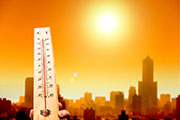- Fragments of Bird Flu Virus Found in 1 in 5 Milk Samples
- Clients Got HIV Through ‘Vampire Facial’ Microneedling Treatments
- Take the Stairs & Step Up to Longer Life
- ‘Drug Take Back Day’ is Saturday: Check for Leftover Opioids in Your Home
- Loneliness Can Shorten Lives of Cancer Survivors
- A Stolen Dog Feels Like Losing a Child, Study Finds
- Healthier Hearts in Middle Age Help Black Women’s Brains Stay Strong
- Better Scans Spot Hidden Inflammation in MS Patients
- Which Patients and Surgeries Are ‘High Risk’ for Seniors?
- Vancomycin May Be Losing Strength Against Common Deadly Infection
Cities Are Getting Hotter, New Research Reports


The number of heat waves has risen over the past 40 years, particularly in urban areas, a new study says.
Researchers analyzed data from 217 cities around the world and found that between 1973 and 2012 the number of heat waves increased significantly in 48 percent of them. Only 2 percent of the cities had a large decrease in heat waves.
“Our findings suggest that urban areas are experiencing a kind of double whammy — a combination of general climatic warming combined with the heat island effect, wherein human activities and the built environment trap heat, preventing cities from cooling down as fast as rural areas,” said study co-author Dennis Lettenmaier. He is a geography professor at the University of California, Los Angeles.
“Everything’s warming up, but the effect is amplified in urban areas,” he said in a university news release.
The researchers also found that nearly two-thirds of the cities had large increases in the number of extremely hot nights.
“The fact that the trend was so much stronger at night underscores the role of the heat island effect in urban areas,” Lettenmaier said.
“You have heat being stored in buildings and in asphalt, concrete and other building materials, and they don’t cool down as quickly as they would outside of the urban area. This effect was likely exacerbated by decreasing wind in most of the urban areas,” he explained.
The study was published recently in the journal Environmental Research Letters.
More information
The U.S. Centers for Disease Control and Prevention has more about extreme heat.
Source: HealthDay
Copyright © 2024 HealthDay. All rights reserved.









